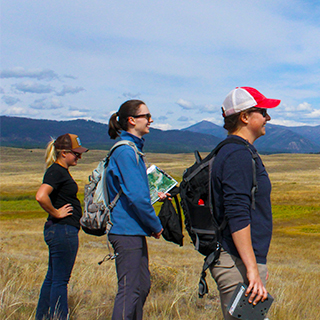ElevateU - Explore The Foundation of Career Readiness

Discover how career readiness can support your students in professional and academic pathways.
Explore ElevateU’s faculty-centered resources to learn more about the foundation to curriculum integration including UM’s high impact practices and career readiness competencies.

Visualization
- In 2019 a new vision was created from the President and Provost office’s resulting in a new unit on campus – Experiential Learning and Career Success. This was a merger of three former offices: Career Services, Academic Enrichment (internships Services), and the Office for Civic Engagement.
Institutionalization
- UM’s signature career readiness program, ElevateU, was launched in 2020 as a collaboration with PFAs and faculty. ElevateU addresses the evolving higher education landscape, ensuring graduates are not only academically proficient but also equipped with essential workplace skills.
Implementation
- High Impact Practices were defined by the Faculty Senate and expanded use of attributes were linked to courses. ELCS hosted a faculty intensive design effort for how best to integrate career readiness in the curriculum.
Optimization
- This initiative is making steady progress in seamlessly integrating career competencies into academic courses and setting a positive path for the future of higher education. In 2023, the Gen Ed Committee passed a motion to incorporate career readiness competencies into all gen ed courses and the inaugural college level ElevateU Dean’s Report were presented.
Expansion
- Career readiness curricular integration is incorporated into FY 2024 Academic Playbook. Integration of career readiness skills across the curriculum is a multi-year strategy that is part of UM’s PFA Playbook; Objective 3: Build career readiness, experiential learning, sustained research and creative scholarship projects into general education and degree programs as appropriate with attention paid to scale and disciplinary best practices. To better support faculty in curricular infusion efforts, the Career Readiness Community of Practice was launched and most recently, the Faculty Senate passed the motion to include career readiness competencies into all gen ed courses on a rolling basis.
Why are we doing this work?
The curricular and co-curricular integration of career readiness is critical in students’ understanding of how the totality of their UM experience contributes to career preparation, particularly their classroom learning. The most fundamental way for UM to improve on career readiness and fully integrate ElevateU is to place it at the table as a component of the academic mission, pedagogy, and programming.
As we progress on this journey, UM remains committed to embracing the changing landscape of higher education. ElevateU uses student outcomes and national data to help guide its work.
Check out the why for each stakeholder group to learn more.
Resources to Build your Foundation
UM’s Faculty Senate approved High Impact Practice definitions and attributes to better identify high-impact courses and support best practices for increasing student retention and engagement rates.
- Review University of Montana's High Impact Practice Definitions and Attributes
- Learn More About Research on High Impact Practices
How Can I Integrate HIP's Into my Courses or Student Programming?
To integrate High Impact Practices (HIPs) into your courses or student programming at UM, faculty are encouraged to incorporate HIPs into relevant courses and attach the corresponding course attribute through UM’s CourseLeaf platform. This attribute aids UM in tracking and supporting HIP courses.
For training or individual consultations on integrating HIPs into curricula, contact Experiential Learning & Career Success at melissa.dadmun@mso.umt.edu.
UM has adopted 10 Career Readiness Competencies. Linking curricular learning objectives to career readiness competencies is important to students' success in the classroom and in the workforce. ELCS helps faculty tomorrow-proof our students by weaving both curricular learning outcomes and career readiness competencies into course syllabi in order to make in-and-out-of-classroom education seamless.
ELCS offers engaging presentations on various career-related topics to ensure students are equipped with the knowledge and skills they need to thrive in their chosen professions.
- View our full menu of presentation topics. To make a request, please fill out our request form.
Coming Soon!
The Faculty Career Readiness Starter Guide supports a wide range of disciplines, teaching methods, and educational contexts. Whether you're a seasoned educator or a new faculty member, teaching undergraduate or graduate courses, this guide provides adaptable approaches to suit your specific needs. From understanding the foundational principles of career readiness to implementing experiential learning activities and assessing student development, this guide offers practical guidance to help you create a holistic learning experience that goes beyond the classroom.
Looking for other strategies, tools, and insights needed to integrate career readiness into your teaching practices? Need assistance with integrating career readiness language into your course syllabi and activities? Reach out for one-on-one consultation with the ELCS Curriculum Coach, melissa.dadmun@mso.umt.edu.
- Consider activities to help students gain information about careers that interest them at ONetOnline.org
- Have students explore What can you do with your major? to see what career pathways align with their major/studies
- Encourage students to take electives and/or a career readiness class to investigate their interests
- Share the diverse student clubs available at UM and encourage students to get involved. Better yet, add points for participation!
- Invite Griz Alum to your classroom as guest speakers for a story share or panel discussion
- Share the importance of students setting up their UM Handshake account (UM’s main platform for finding internships and employment).
